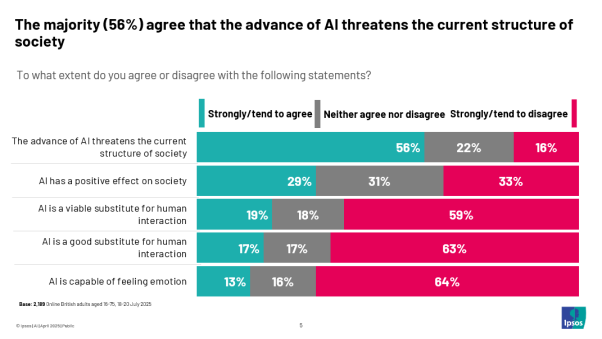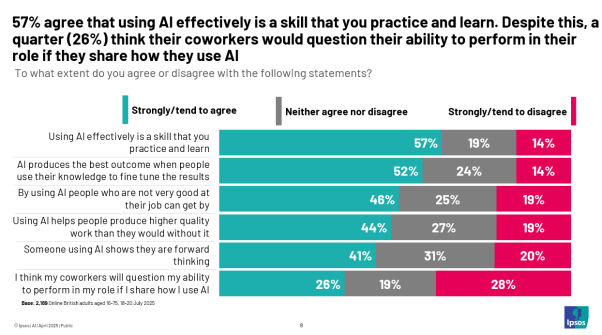-
Almost one in five (18%) say they have used AI as a
source of advice on personal problems.
-
Three in four (67%) say they use polite language when
interacting with AI, with over a third (36%) believing that it
increases the likelihood of a helpful output.
-
However, over half (56%) say that AI threatens the
current structure of society, and 59% think AI is not a viable
substitute for human connection.
A new study from Ipsos in the UK for the Guardian reveals a
surprising intimacy in our interactions with AI, a strong
inclination towards politeness with the technology, and
significant apprehension about its impact on society and the
workplace.
AI as a guidance counsellor
- Nearly one in five (18%) have used AI as a source of advice
on personal problems or issues. This extends to using AI as a
companion or someone to talk to (11%), and even as a substitute
for a therapist or counsellor (9%).
- 7% have sought guidance from AI guidance on romance, while 6%
have used it to enhance their dating profiles.
- Despite this growing interaction and even perceived
friendship with AI, there is a deep-seated anxiety about its
broader societal implications. A majority of Britons (56%) agree
that the advance of AI threatens the current structure of
society, while just 29% say that AI has a positive effect on
society.
- Scepticism is also high regarding AI's ability to replicate
human connection, with 59% disagreeing that AI is a viable
substitute for human interaction and 63% disagreeing that it is a
good substitute. The notion of AI possessing emotional
capabilities is met with even greater disbelief, as 64% disagree
that AI is capable of feeling emotion.

Politeness to AI
- Three in four (67%) British adults who interact with chatbots
or AI tools say that they 'always' or 'sometimes' use polite
language, such as 'please' and 'thank you'.
- Over a third (36%) think that being polite to AI improves the
likelihood of receiving a helpful output. Furthermore, around
three in ten believe politeness positively impacts the accuracy
(30%) and level of detail (32%) of the AI's response.
AI in the workplace
- Over a quarter (27%) of those who have considered applying
for a job in the last three years have used AI to write or update
their CV, and 22% have used it to draft a cover letter. Two in
ten (20%) say they have used it to practice interview questions.
However, four in ten (40%) say that they have not used AI when
considering applying for a job.
- However, the use of AI in the workplace is often a
clandestine affair. Around three in ten workers (29%) do not
discuss their use of AI with colleagues. This reluctance may stem
from a fear of judgement, as a quarter (26%) of adults think
their coworkers would question their ability to perform their
role if they knew about their AI use. This is despite the fact
that a majority (57%) view using AI effectively as a skill that
is learned and practiced.

Commenting on the findings, Peter Cooper, Director at
Ipsos said:
"This research paints a fascinating picture of a nation
grappling with the dual nature of artificial intelligence. On one
hand, we see that a growing number are ‘AI-sourcing' for personal
advice and companionship, suggesting a level of trust and
reliance that is surprisingly personal. On the other hand,
there's a palpable sense of unease about what AI means for the
future of our society and our jobs. The fact that many are polite
to AI, perhaps in the hope of better outcomes, while
simultaneously hiding their use of it at work, speaks to the
complex and sometimes contradictory relationship we are building
with this transformative technology."
Notes to Editors:
-
For the full findings,
please visit the Ipsos website.
- Ipsos interviewed a representative sample of 2,189 adults
aged 16-75 across Great Britain. Polling was conducted online
between the 18th-20th July
2025.
- Data are weighted to match the profile of the population. All
polls are subject to a wide range of potential sources of error.


